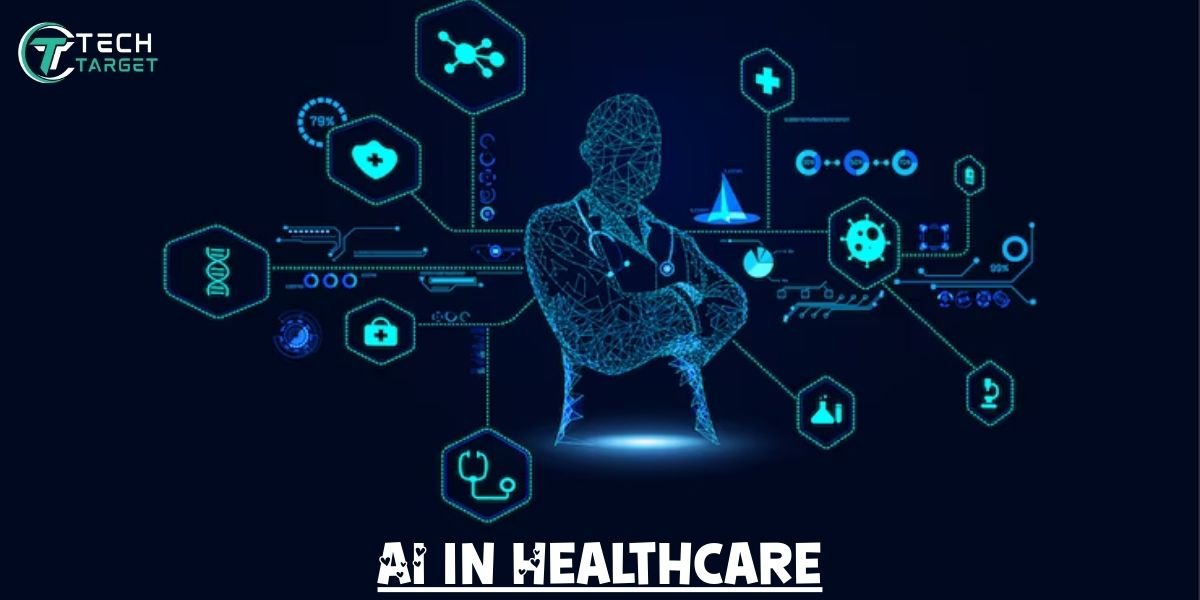Artificial intelligence has various use cases across different industries globally. The healthcare sector is no different, as modern machinery comes equipped with sophisticated software. Artificial intelligence is a part of these machines and provides healthcare professionals and institutions with game-changing benefits. This disruptive area of computers is potentially transforming the medicine and healthcare sector, with 42% of total healthcare funding share spent on AI companies in 2024. This blog will discuss the role of AI in healthcare and will help you understand the use cases of this sophisticated technology from the doctor’s as well as the patient’s perspective.
What is the Role of AI in Healthcare?
AI amplifies and augments the role of humans rather than replacing it, especially in healthcare. The focus of development in healthcare is AI and other sophisticated tools. Despite all these efforts, AI solutions are not as trustworthy as those in other industries. However, there are various use cases that make AI solutions helpful as well as highly efficient assistants for large-scale medical centers. AI can enhance medical solutions with intelligent data processing, disease detection, tailored treatment plans, cost reduction, and faster processing. Let’s dive further into the significance of AI in the medical sector.
Use Cases of AI in Healthcare: Game-Changing Significance
Microsoft Dragon Copilot is a primary example of AI use in healthcare. The recent addition of Microsoft to the health sector allows professionals to perform a wide range of tasks. Dragon Copilot can create clinical notes and listen to doctors or any sort of consultations. Other than Microsoft, Google also has several AI models that contribute to the administrative work in the healthcare domain. Moreover, countries are working on AI solutions to create complete healthcare platforms, for instance, Elea.
It is a German-based AI platform that can run diagnoses and tests at fast rates, reducing the processing times. Tasks that take weeks can be completed in hours using Elea. The founders of this platform say that the solution is “an ally, not an obstacle” in terms of advancements and nature’s goodwill. These AI solutions have a positive impact on the healthcare industry. Here are the top 5 use cases of AI in healthcare.
Patient Diagnosis
Traditional medical diagnosis is a time-consuming process in which several manual assessments, tests, and inspections are involved. To overcome this condition, AI in healthcare proves to be a powerful tool that can rapidly analyze medical images, patients’ records, and even laboratory reports to highlight possible issues. It can process X-rays, MRIs, and other diagnostic reports to detect any sort of abnormalities in the health data. Moreover, the sensors present on modern wearable devices, such as the Samsung Galaxy Watch and other devices, use similar AI solutions to extract human diagnostic data. This is why these gadgets prompt the user upon detecting unusual patterns in health data.
Administrative Applications
In the healthcare sector, the administrative load is quite high. AI comes with the power of automation that allows swift solutions to all repetitive tasks such as data entry, processing of claims, and booking a new appointment for the patients. With AI, healthcare professionals can also free up their time by handing mundane tasks to a computer. This helps them focus more on the key aspects, such as patient care and revenue cycle management. Another plus point here is that AI processes data accurately without any chances of human errors. Moreover, it can analyze the patient’s records and claim the test results much faster.
Intelligent Lab Testing
Speaking of Lab testing, AI in Healthcare is much more intelligent and twice as accurate as professionals. In recent research, AI solutions can scan brain strokes more accurately. The research was performed in a UK university where the software was trained on an experimental dataset (over 800 brain scans for stroke patients). The results were impressive; the system then tested out over 2000 patients with nearly accurate results. Moreover, the software system also analyzed the timescale of the stroke, which is a crucial health insight for professionals to identify and deal with the health problem. Furthermore, in the X-Ray department, the AI system was tested by the UK’s National Institute for Health & Care Excellence (NICE). The results were as expected, after which the technology was announced safe to use and reliable for professional appointments.
Patient’s Critical Assessment
The critical assessment of patients is an integral operation of the healthcare team, requiring quick and attentive response. For instance, in the UK, an ambulance transports more than 350,000 people to healthcare centers every month. The paramedics need to decide which patients can go and which do not require hospitalization. All of this comes down to critical assessment, which is a time-consuming process. Different aspects need to be taken care of in this scenario, for instance, the availability of beds and doctoral staff at the nearest medical center.
AI in healthcare solutions can solve this issue with practical model training. A recent research in Yorkshire (North of UK) identified that AI models can correctly predict patients’ states with intelligent assessment in 80% of the cases. These models used patients’ statistics like mobility, pulse rate, blood pressure, and other medical aspects to prove their eligibility with complete transparency. However, NICE (National Institute for Health & Care Excellence) warned that before putting this experiment to use, the models must be trained more comprehensively, and more testing is required.
Early Disease Detection
The detection of diseases is a crucial process, especially in cases of severity. One of the key hurdles in the patient’s health cycle is the identification of the disease or underlying health issue. As many people say, diagnosing the problem is half the solution of it. AI comes in handy in this regard as it can help patients identify their problems by analyzing their symptoms and learning from their health history.
Recently, a new AI model (from the developers AstraZeneca) was introduced that can detect disease presence in patients even before any symptoms or changes in patients’ lifestyles. It uses patient data from over 500,000 people from the UK as a learning dataset. According to the research lead of this project, Slavé Petrovski, “We can pick up signatures in an individual that are highly predictive of developing diseases like Alzheimer’s, chronic obstructive pulmonary disease, kidney disease and many others.”
This also assists doctors and healthcare professionals in understanding the situation better and helps them find a cure more easily.
Final Thoughts
In a nutshell, AI solutions have been incorporated significantly across different industries. AI in healthcare is transforming the way of working from patient diagnosis to critical assessment. However, some limitations and constraints define the scope of AI usage. Doctors and health professionals find it as a great assistant that can help boost the healthcare industry with intelligent administrative working, reducing times and increasing efficiency. Furthermore, AI in healthcare packs great potential for the future with advancements in machine learning, neural networks, and image processing technologies. With comprehensive training and guidance from professionals, it can be used as a future assistant in the healthcare sector.













